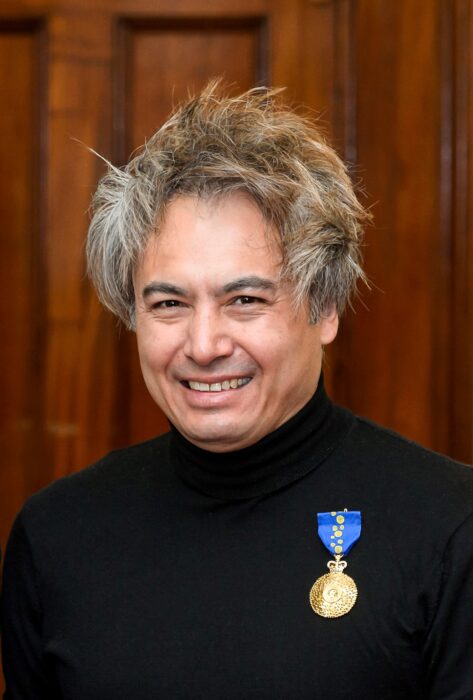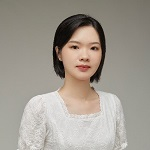Speech Title: Visual Thinking in Education: Transforming Learning through Information Visualization


Prof. Adrian David Cheok
Nanjing University of Information Science and Technology, China
Adrian David Cheok AM FIET FIEAust FRSA is Full Professor at Nanjing University of Information Science and Technology, Director of the Imagineering Institute, Malaysia, Visiting Professor at Raffles University, Malaysia, Visiting Professor at University of Novi Sad-Serbia, on Technical faculty “Mihailo Pupin”, Serbia, Faculty of Ducere Business School, and CEO of Nikola Tesla Technologies Corporation.
In 2024, Professor Adrian David Cheok was honored with induction as a Full Member into Sigma Xi USA, The Scientific Research Honor Society, a
recognition that not only signifies his dedication to scientific excellence but also aligns his contributions with those of groundbreaking researchers. Sigma Xi is a beacon of distinction within the global scientific community, boasting over 200 Nobel Laureates among its members, including luminaries such as Albert Einstein. This prestigious society is renowned for its commitment to the advancement of science and engineering and includes among its distinguished members other eminent personalities like Linus Pauling and Guglielmo Marconi, whose pioneering work has indelibly shaped the landscape of modern science and innovation. Professor Cheok’s association with Sigma Xi marks a pinnacle in his career, affirming his commitment to the ethos of rigorous and impactful scientific inquiry.
Speech Title: Everysense Everywhere Human Communication
Abstract:This talk outlines new facilities that are arising in the hyperconnected internet era within human media spaces. This allows new embodied interaction between humans, species, and computation both socially and physically, with the aim of novel interactive communication and entertainment. Humans can develop new types of communication environments using all the senses, including touch, taste, and smell, which can increase support for multi-person multi-modal interaction and remote presence. In this talk, we present an alternative ubiquitous computing environment and space based on an integrated design of real and virtual worlds. We discuss some different research prototype systems for interactive communication, culture, and play.

Assoc. Prof. Chen Xieling
Guangzhou University, China
Dr. Chen Xieling graduated with a Ph.D. from The Education University of Hong Kong in 2022. In 2023, she joined the School of Education at Guangzhou University as an Outstanding Young Scholar of the "Hundred Talents Program". She is currently an Associate Professor and Master's supervisor at Guangzhou University. Dr. Chen has led several research projects, including those funded by the National Natural Science Foundation of China and the Guangdong Provincial Social Science Planning Program. Her research interests include AI in education, technology-enhanced learning, and natural language processing. To date, Dr. Chen has published over 80 papers in national and international journals and conferences, with more than 40 of these appearing in prominent SCI/SSCI journals such as Computers & Education, Information Processing & Management, and the International Journal of Educational Technology in Higher Education. Two of her papers have been recognized as ESI Highly Cited Papers. She serves as Executive Editor or Executive Associate Editor for Elsevier journals including Computers and Education: Artificial Intelligence, Computers and Education: X Reality, and the Natural Language Processing Journal. She holds two software copyrights and has applied for three invention patents. Dr. Chen has received awards for her research, including the Best Paper Award at the 2020 International Conference on Blended Learning. She has also served as General Chair or Vice Chair for conferences such as the BESC 2022 Special Session and GCCCE 2023 C6. As of November 2024, her work has been cited 4,800 times on Google Scholar, with an h-index of 31 and an i10-index of 45. Stanford University has listed her as one of the World's Top 2% Scientists in three consecutive years (2022, 2023, and 2024).
Speech Title: AI and Big Data-driven Online Learning Analytics
Abstract: In recent years, empirical MOOC research has increasingly emphasized educational data mining and learner-centered perspectives such as learner perceptions and satisfaction. This keynote synthesizes research on online course review analysis, beginning with a systematic review of the theories, themes, and methods used in this field. Building on this foundation, I will highlight several AI- and big data-driven studies, including the use of deep learning, sentiment analysis, and structural topic modeling to extract insights from learner reviews. Key contributions include analyses using fine-tuned BERT models, multilingual sentiment classification, and novel review mining approaches to understand and predict MOOC satisfaction. Further, I will explore recent advances in automated classification of online learner-generated content, such as Chinese programming MOOC reviews and online course evaluations, using GPT-augmented data, deep neural networks, and domain-specific transformer models. Lastly, I will discuss broader applications of AI in online learning analytics, including methods like text mining with analytic hierarchy processes and epistemic/social network analysis to evaluate teaching and learning interactions. This talk aims to provide a comprehensive overview of how AI and big data are transforming our understanding of online learning at scale, with implications for both research and practice.

Assoc. Prof. Madihah Sheikh Abdul Aziz
International Islamic University Malaysia, Malaysia
Dr. Madihah is a senior lecturer and researcher specializing in User Experience (UX) and User Interface (UI) Design, Information Visualization, and Creative Media Design. She holds a Bachelor's Degree in Information Technology from Universiti Kebangsaan Malaysia, a Master's in Computer Science from Universiti Putra Malaysia, and a PhD from Swinburne University of Technology, Melbourne, Australia, where she received a Research Fellowship Grant. With extensive experience in teaching and research, Dr. Madihah has contributed to the fields of UI/UX, human-computer interaction, storytelling in visualization, and digital media design. She has also served as an expert panel member for academic evaluations and has published widely in indexed journals and conferences, reflecting her dedication to advancing knowledge and practice in her areas of expertise.
Abstract: In an age of information overload, the ability to decode, interpret, and communicate data has become a fundamental skill. Information visualization offers powerful ways to make complex ideas accessible, to promote deeper understanding, and to foster critical thinking among learners. This keynote explores how visual storytelling and interactive data representations can enhance educational experiences across disciplines—from science and mathematics to humanities and social sciences. Drawing on case studies, educational technology tools, and pedagogical frameworks, the session highlights the evolving role of information visualization in modern classrooms and digital learning environments. It will discuss strategies to integrate visual thinking into curricula, support data literacy, and empower both educators and learners to engage with data meaningfully. Whether you're an academic, a curriculum designer, or a practitioner, this talk offers practical insights on designing learning that is not only data-informed but visually impactful.